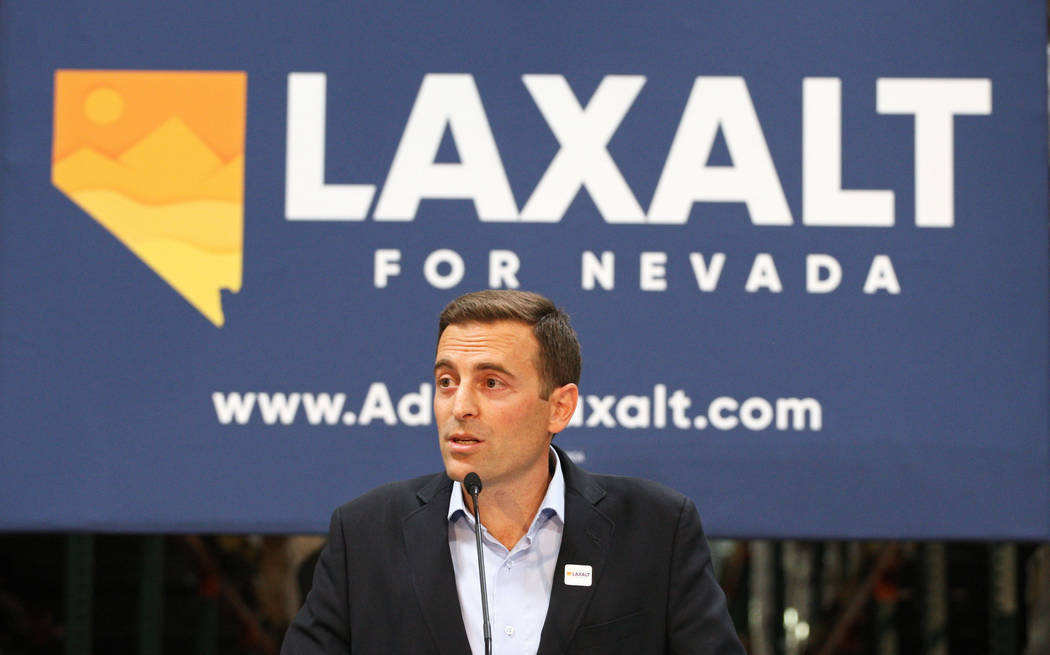AG intervenes in ADA litigation ‘to protect the public’s interest’



High-profile litigation involving a Las Vegas man who filed 274 federal lawsuits claiming violations of the Americans with Disabilities Act has potential to play a role in Attorney General Adam Laxalt’s bid for governor.
Laxalt’s office has argued it needed to intervene in the slew of ADA cases in order to protect the public because the lawsuits “directly, adversely impact Nevada’s economy.”
The Republican attorney general contends the lawsuits filed this year against Southern Nevada businesses were motivated primarily for financial gain. “I will aggressively fight to protect the public’s interest, including the rights of businesses and consumers,” Laxalt said in a news release.
Attorney Whitney Wilcher countered his client, Kevin Zimmerman, is a “tester” trying to improve life for the disabled. In one case being argued, Zimmerman sued because a 7-Eleven had aisles narrower than 36 inches and failed to provide “van accessible” signs.
U.S. Magistrate Judge George Foley recommended that the AG’s office be allowed to intervene, but he found one of the AG’s legal reasons “without merit.”
Senior Deputy Attorney General Lucas Tucker argued that Zimmerman, who uses a wheelchair, should have notified the Nevada Equal Rights Commission before filing lawsuits.
Wrong.
That argument had already been decided by a Ninth Circuit opinion in 2000. The opinion said: “A plaintiff in a private Title III action is not required to provide notice to any state or local agency as a prerequisite to filing suit.”
Kind of a big legal error when the AG’s office represents the Nevada Equal Rights Commission.
The AG wants to consolidate the remaining cases and get them dismissed. If the office fails, when other attorneys general in Western states have won similar cases, it would raise questions about the competence of the office. However, if the AG protects the public with victories, that could be a positive, presuming the ADA cases filed earlier this year are resolved by next November.
The final decision about allowing Laxalt to intervene will be made by Chief District Judge Gloria Navarro, who is hearing all the cases, whether they are consolidated or not.
New information
Foley’s Oct. 11 opinion, based on a Sept. 5 hearing, had some information I hadn’t reported before.
Zimmerman said he received $50 per case, or $13,700 total, for the 274 lawsuits he’s filed.
Meanwhile, his Las Vegas attorney Whitney Wilcher told Foley he was paid $100 per case, or $27,400.
The attorney said then that 184 cases have been dismissed or settled for an average of $2,000. Wilcher said none settled for more than $3,900.
Sources told me that Wilcher had asked for between $3,900 and up to $7,500 per case.
The settlements were probably less than what was asked.
Litigation Management and Financial Services LLC funds the actions but didn’t respond to my queries Tuesday about its operations.
But in July, a story published in the American Bar Association Journal said that in New Mexico, a Santa Fe attorney filed 99 cases representing one defendant, Alyssa Carton. In an opinion authored by Chief U.S. Magistrate Judge Karen Molzen, the facts as spelled out were similar to Zimmerman’s, including the link to Litigation Management and Financial Services.
Both plaintiffs were paid $50 per ADA complaint.
Both attorneys received $100 per case.
Both had contracts with Litigation Management and Financial Services.
Both plaintiffs claimed to be paupers to avoid the $400 court filing fees.
Wilcher said in documents trying to keep Laxalt from intervening that the AG is trying to create “a haven for those who wish to abuse those with disabilities without any punishment.”
Filings called into question
I’ve been clear in earlier columns I believe the Zimmerman cases are a money-making scam, not a sincere effort to improve the lives of the disabled.
Foley seems to agree with me. He wrote, “The number of lawsuits filed by Zimmerman in such a short time frame seriously calls into question the credibility of his allegations that he intends to return to these businesses, and whether his actions are legitimately directing at obtaining compliance with the ADA.”
If Laxalt’s office fails to prove these are scams, two things occur: I look like a hard-hearted jerk, and his office looks incompetent.
If the AG proves itself as competent as attorneys general in other Western states, then Laxalt has an issue to campaign on, possibly even positive ad material.
Something like, “I said I’d protect businesses and consumers, and I did.”
Jane Ann Morrison’s column runs Thursdays in the Nevada section. Contact her at jane@reviewjournal.com or 702-383-0275. Follow @janeannmorrison on Twitter.












